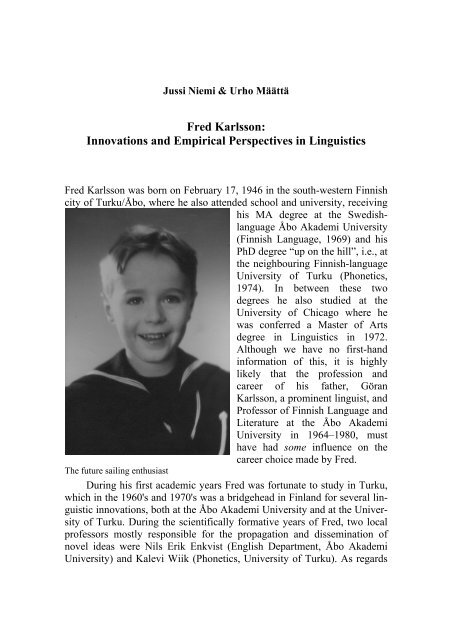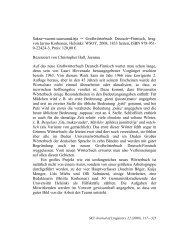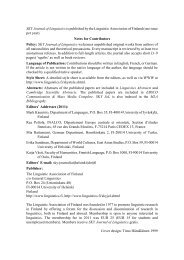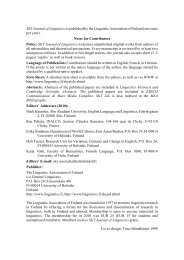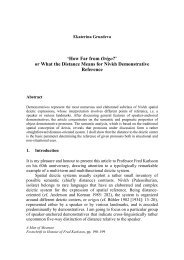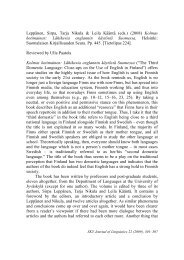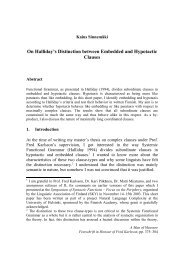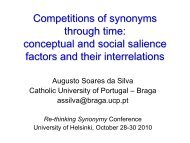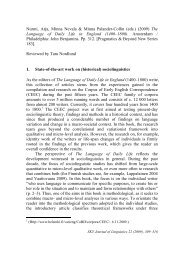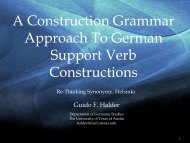Fred Karlsson: Innovations and Empirical Perspectives in Linguistics
Fred Karlsson: Innovations and Empirical Perspectives in Linguistics
Fred Karlsson: Innovations and Empirical Perspectives in Linguistics
Create successful ePaper yourself
Turn your PDF publications into a flip-book with our unique Google optimized e-Paper software.
Jussi Niemi & Urho Määttä<br />
<strong>Fred</strong> <strong>Karlsson</strong>:<br />
<strong>Innovations</strong> <strong>and</strong> <strong>Empirical</strong> <strong>Perspectives</strong> <strong>in</strong> L<strong>in</strong>guistics<br />
<strong>Fred</strong> <strong>Karlsson</strong> was born on February 17, 1946 <strong>in</strong> the south-western F<strong>in</strong>nish<br />
city of Turku/Åbo, where he also attended school <strong>and</strong> university, receiv<strong>in</strong>g<br />
his MA degree at the Swedishlanguage<br />
Åbo Akademi University<br />
(F<strong>in</strong>nish Language, 1969) <strong>and</strong> his<br />
PhD degree “up on the hill”, i.e., at<br />
the neighbour<strong>in</strong>g F<strong>in</strong>nish-language<br />
University of Turku (Phonetics,<br />
1974). In between these two<br />
degrees he also studied at the<br />
University of Chicago where he<br />
was conferred a Master of Arts<br />
degree <strong>in</strong> L<strong>in</strong>guistics <strong>in</strong> 1972.<br />
Although we have no first-h<strong>and</strong><br />
<strong>in</strong>formation of this, it is highly<br />
likely that the profession <strong>and</strong><br />
career of his father, Göran<br />
<strong>Karlsson</strong>, a prom<strong>in</strong>ent l<strong>in</strong>guist, <strong>and</strong><br />
Professor of F<strong>in</strong>nish Language <strong>and</strong><br />
Literature at the Åbo Akademi<br />
University <strong>in</strong> 1964–1980, must<br />
have had some <strong>in</strong>fluence on the<br />
career choice made by <strong>Fred</strong>.<br />
The future sail<strong>in</strong>g enthusiast<br />
Dur<strong>in</strong>g his first academic years <strong>Fred</strong> was fortunate to study <strong>in</strong> Turku,<br />
which <strong>in</strong> the 1960's <strong>and</strong> 1970's was a bridgehead <strong>in</strong> F<strong>in</strong>l<strong>and</strong> for several l<strong>in</strong>guistic<br />
<strong>in</strong>novations, both at the Åbo Akademi University <strong>and</strong> at the University<br />
of Turku. Dur<strong>in</strong>g the scientifically formative years of <strong>Fred</strong>, two local<br />
professors mostly responsible for the propagation <strong>and</strong> dissem<strong>in</strong>ation of<br />
novel ideas were Nils Erik Enkvist (English Department, Åbo Akademi<br />
University) <strong>and</strong> Kalevi Wiik (Phonetics, University of Turku). As regards
INNOVATIONS AND EMPIRICAL PERSPECTIVES IN LINGUISTICS<br />
<strong>Fred</strong>, we may, <strong>in</strong>ter alia, note that he was a member <strong>in</strong> the Group <strong>in</strong> Text<br />
L<strong>in</strong>guistics led by Nils Erik Enkvist. The other members were Erik<br />
Andersson, Auli Hakul<strong>in</strong>en, Viljo Kohonen, Jan-Ola Östman <strong>and</strong> Marianne<br />
von Wright; project lasted from September 1974 to August 1977. As the<br />
<strong>in</strong>formed reader will note, <strong>in</strong> addition to <strong>Fred</strong>, many of the junior members<br />
were later to hold high posts at language <strong>and</strong> l<strong>in</strong>guistics departments <strong>in</strong><br />
F<strong>in</strong>l<strong>and</strong>. One concrete sp<strong>in</strong>-off from the work of this group, viz.,<br />
Nykysuomen lauseoppia co-authored by <strong>Fred</strong> <strong>and</strong> Auli Hakul<strong>in</strong>en 1 was<br />
preceded by a first large-scale quantitative study of written F<strong>in</strong>nish<br />
sentences by <strong>Fred</strong>, Auli Hakul<strong>in</strong>en <strong>and</strong> Maria Vilkuna. 2<br />
Although <strong>Fred</strong> has s<strong>in</strong>ce 1980 been Professor of General L<strong>in</strong>guistics at<br />
the University of Hels<strong>in</strong>ki <strong>and</strong> also a<br />
resident of the F<strong>in</strong>nish capital, he<br />
<strong>and</strong> his family divide their time<br />
between Hels<strong>in</strong>ki <strong>and</strong> the<br />
Åbo/Turku area: S<strong>in</strong>ce the mid-<br />
1950s <strong>Fred</strong> has spent his summers<br />
<strong>in</strong> the isl<strong>and</strong> community of Nagu (<strong>in</strong><br />
F<strong>in</strong>nish Nauvo) where he <strong>and</strong> his<br />
two brothers now share a summer<br />
residence. It is at least here where<br />
<strong>Fred</strong> can carry out one his hobbies,<br />
viz., mow<strong>in</strong>g the lawn, dur<strong>in</strong>g the<br />
long, long F<strong>in</strong>nish summer days,<br />
while one of the two rema<strong>in</strong><strong>in</strong>g<br />
hobbies of the three recorded by<br />
him for the bibliography Vem och<br />
vad 2000, viz., collect<strong>in</strong>g old<br />
grammar-books, is likely to be a<br />
more urban activity.<br />
xi<br />
Freshly m<strong>in</strong>ted high school graduate<br />
1 Auli Hakul<strong>in</strong>en & <strong>Fred</strong> <strong>Karlsson</strong>. Nykysuomen lauseoppia [‘Syntax of Present-day<br />
F<strong>in</strong>nish’], 1979. For the exact bibliographical <strong>in</strong>formation on the <strong>Karlsson</strong>’s texts<br />
mentioned here, see the Bibliography <strong>in</strong> the next section.<br />
2 Auli Hakul<strong>in</strong>en, <strong>Fred</strong> <strong>Karlsson</strong> & Maria Vilkuna. Suomen tekstilauseiden piirteitä:<br />
kvantitatiiv<strong>in</strong>en tutkimus [‘Features of F<strong>in</strong>nish Sentences <strong>in</strong> Text: A quantitative study’],<br />
1980; see also his article “F<strong>in</strong>nish syntax <strong>in</strong> text: Methodology <strong>and</strong> some results of a<br />
quantitative study”, 1980, co-authored with Auli Hakul<strong>in</strong>en.
xii<br />
JUSSI NIEMI & URHO MÄÄTTÄ<br />
<strong>Fred</strong>’s PhD thesis: A pioneer study promot<strong>in</strong>g a paradigm shift <strong>in</strong><br />
F<strong>in</strong>nish grammatical tradition<br />
In May 1974 <strong>Fred</strong> <strong>in</strong>troduced to the F<strong>in</strong>nish l<strong>in</strong>guistic community the<br />
theoretical foundations <strong>and</strong> the first applications of concrete generative<br />
grammar <strong>in</strong> his PhD thesis. 3 Dur<strong>in</strong>g the long public defense he <strong>and</strong> his<br />
opponent Kalevi Wiik carried at places heated, but ever so polite<br />
argumentation about the pros <strong>and</strong> cons of the new versus the old generative<br />
approach. The debate was exceptionally vivid mostly because what <strong>Fred</strong><br />
was vouch<strong>in</strong>g for <strong>in</strong> his thesis was directed aga<strong>in</strong>st the Chomsky – Halle<br />
SPE type abstract “phonology“ that had been <strong>in</strong>troduced to F<strong>in</strong>l<strong>and</strong> seven<br />
years earlier by his opponent <strong>in</strong> monograph form. In addition to their<br />
common background <strong>in</strong> the Department of Phonetics at Turku, another<br />
aspect was shared by these two approaches (<strong>and</strong> by the two persons mostly<br />
responsible for campaign<strong>in</strong>g for these approaches), viz., the vehement<br />
critique that they sometimes raised among the established tradition of<br />
F<strong>in</strong>nish-language studies (Fennistics), which <strong>in</strong> those days had been<br />
lagg<strong>in</strong>g beh<strong>in</strong>d <strong>in</strong> theoretical <strong>and</strong> methodological issues. The concrete<br />
generative view on the phonology <strong>and</strong> morphology of F<strong>in</strong>nish, adopted by<br />
<strong>Fred</strong> <strong>in</strong> his PhD thesis, later led to a comprehensive presentation on the<br />
topic, 4 which presents its readers with a new model of generation of F<strong>in</strong>nish<br />
word-forms.<br />
Quantitative analyses of corpora, developmental activities with<strong>in</strong><br />
computer <strong>and</strong> computational l<strong>in</strong>guistics<br />
If one is <strong>in</strong>to concrete generative morphology, a pervasive variable of<br />
language use that is to be taken <strong>in</strong>to consideration is the relative frequency<br />
of units (e.g., lemmas, stem allomorphs, affixes), s<strong>in</strong>ce aspects of<br />
frequency of use do, for <strong>in</strong>stance, affect the productivity of compet<strong>in</strong>g<br />
words <strong>and</strong> paradigms <strong>in</strong>, e.g., language acquisition <strong>and</strong> diachronic<br />
processes. Now we are able to tie the two threads of <strong>Fred</strong>’s early research<br />
career <strong>and</strong> state that what first were, on the one h<strong>and</strong>, theoretical modell<strong>in</strong>g<br />
3 Centrala problem i f<strong>in</strong>skans böjn<strong>in</strong>gsmorfologi, morfofonematik och fonologi [‘Central<br />
Problems of Inflectional Morphology, Morphophonemics <strong>and</strong> Phonology of F<strong>in</strong>nish’],<br />
1974.<br />
4 Suomen kielen äänne- ja muotorakenne [‘Phonology <strong>and</strong> Morphology of F<strong>in</strong>nish’],<br />
1983.
INNOVATIONS AND EMPIRICAL PERSPECTIVES IN LINGUISTICS<br />
of generative morphology of F<strong>in</strong>nish <strong>and</strong>, on the other, frequency analyses<br />
of large corpora developed <strong>in</strong>to sp<strong>in</strong>-offs that were to have far-reach<strong>in</strong>g<br />
consequences <strong>in</strong> language studies <strong>in</strong> F<strong>in</strong>l<strong>and</strong> <strong>and</strong> abroad. With these<br />
consequences we naturally enough refer to the development of tools <strong>in</strong><br />
computer l<strong>in</strong>guistics <strong>in</strong> general <strong>and</strong> the development of the field of<br />
computer/computational l<strong>in</strong>guistics as an academic subject <strong>in</strong> F<strong>in</strong>l<strong>and</strong> <strong>in</strong><br />
particular. A major <strong>in</strong>stitutional <strong>and</strong> educational repercussion of <strong>Fred</strong>’s<br />
<strong>in</strong>terest <strong>in</strong> quantitative analyses of language <strong>and</strong> computer l<strong>in</strong>guistics <strong>and</strong><br />
of his long-term co-operation with Kimmo Koskenniemi was the creation<br />
of the computational l<strong>in</strong>guistics curriculum with<strong>in</strong> the Department of<br />
General L<strong>in</strong>guistics at the University of Hels<strong>in</strong>ki <strong>in</strong> the late 1980's. 5<br />
Subsequently, alone <strong>and</strong> at times together with Koskenniemi <strong>and</strong> other<br />
colleagues <strong>in</strong> General L<strong>in</strong>guistics <strong>and</strong> related discipl<strong>in</strong>es, <strong>Fred</strong> has further<br />
studied language pars<strong>in</strong>g algorithms eventually produc<strong>in</strong>g a language<strong>in</strong>dependent<br />
formalism for morphological <strong>and</strong> syntactic analysis called<br />
Constra<strong>in</strong>t Grammar. 6<br />
Very much ow<strong>in</strong>g to the Humboldtian view of higher education,<br />
expressions like “our <strong>in</strong>dustrial <strong>and</strong> bus<strong>in</strong>ess partners”, or “technological<br />
applications of our theoretical research” were long felt as oxymora <strong>in</strong> the<br />
discipl<strong>in</strong>es with<strong>in</strong> the humanities, <strong>in</strong>clud<strong>in</strong>g l<strong>in</strong>guistics, <strong>in</strong> F<strong>in</strong>l<strong>and</strong>.<br />
However, <strong>in</strong> the 1980's <strong>Fred</strong>’s close co-operation with Kimmo<br />
Koskenniemi also created what now <strong>in</strong> retrospect may be regarded as a<br />
natural outcome, but what must have been extremely challeng<strong>in</strong>g <strong>in</strong> those<br />
years: Eventually applications of University of Hels<strong>in</strong>ki computer l<strong>in</strong>guists<br />
were modified <strong>in</strong>to concrete language process<strong>in</strong>g programs by L<strong>in</strong>gsoft,<br />
Inc. (established 1986), a major language technology enterprise founded by<br />
the two “K’s” of the Department of General L<strong>in</strong>guistics.<br />
5 For readers <strong>in</strong>terested <strong>in</strong> the history <strong>and</strong> state of the art of this discipl<strong>in</strong>e at Hels<strong>in</strong>ki,<br />
we are now able to refer to the “companion volume” of the present Festschrift, viz.<br />
Antti Arppe, Lauri Carlson, Krister L<strong>in</strong>dén, Jussi Piitula<strong>in</strong>en, Mickael Suom<strong>in</strong>en, Martti<br />
Va<strong>in</strong>io, Hanna Westerlund & Anssi Yli-Jyrä (eds.) Inquiries <strong>in</strong>to Words, Constra<strong>in</strong>ts<br />
<strong>and</strong> Contexts: Festschrift <strong>in</strong> the Honour of Kimmo Koskenniemi on his 60th Birthday.<br />
Stanford, CA: CSLI Publications, 2005.<br />
6 See e.g. <strong>Fred</strong> <strong>Karlsson</strong> & alii (eds.) Constra<strong>in</strong>t Grammar: A language-<strong>in</strong>dependent<br />
system for pars<strong>in</strong>g unrestricted text, 1995.<br />
xiii
xiv<br />
JUSSI NIEMI & URHO MÄÄTTÄ<br />
Historiographical <strong>and</strong> sociological <strong>in</strong>terests <strong>in</strong> language studies<br />
All through his academic career <strong>Fred</strong> has both spoken <strong>and</strong> written about the<br />
historical paths <strong>and</strong> sociological patterns of language studies <strong>in</strong> F<strong>in</strong>l<strong>and</strong>. An<br />
early milestone <strong>in</strong> this branch of his activities was an analysis of the<br />
explicit <strong>and</strong> implicit traditions adopted by F<strong>in</strong>nish language departments<br />
<strong>and</strong> their <strong>in</strong>fluence on research <strong>in</strong> F<strong>in</strong>l<strong>and</strong>. 7 A later exposition <strong>and</strong> a<br />
l<strong>and</strong>mark, not only <strong>in</strong> the historiography of l<strong>in</strong>guistics <strong>in</strong> F<strong>in</strong>l<strong>and</strong>, but also<br />
<strong>in</strong> the Nordic countries is undoubtedly the close to 700-page History of<br />
L<strong>in</strong>guistics <strong>in</strong> the Nordic Countries written by Nordic l<strong>in</strong>guists Even<br />
Hovdhaugen, Carol Henriksen, <strong>Fred</strong> <strong>Karlsson</strong> <strong>and</strong> Bengt Sigurd. 8 On the<br />
F<strong>in</strong>nish soil, two <strong>in</strong>terest<strong>in</strong>g add-ons to this Nordic survey are, first of all,<br />
<strong>Fred</strong>’s analyses of PhD theses <strong>in</strong> languages <strong>and</strong> l<strong>in</strong>guistic discipl<strong>in</strong>es <strong>in</strong><br />
F<strong>in</strong>l<strong>and</strong>. 9 A more focused analysis is to be found <strong>in</strong> his monograph on<br />
F<strong>in</strong>nish l<strong>in</strong>guistics seen through a citation analysis. 10 In addition to these<br />
writ<strong>in</strong>gs his contribution (shared by Nils Erik Enkvist) to the<br />
historiography of language studies <strong>in</strong> F<strong>in</strong>l<strong>and</strong> is available <strong>in</strong> the fourvolume<br />
history of F<strong>in</strong>nish science (<strong>in</strong> the sense of ‘Wissenschaft’)<br />
published <strong>in</strong> 2000. 11<br />
Institutional activities<br />
<strong>Fred</strong> has been an active participant <strong>in</strong> bodies of academic adm<strong>in</strong>istration<br />
(e.g., Dean of the Faculty of Arts, University of Hels<strong>in</strong>ki), various plann<strong>in</strong>g<br />
committees, teams of academic evaluators, <strong>and</strong> task groups as well as an<br />
agent <strong>in</strong> a number of l<strong>in</strong>guistic associations. If we, as floor-level l<strong>in</strong>guists,<br />
were given the possibility of present<strong>in</strong>g merely one of the many of his<br />
break-through <strong>and</strong> permanent contributions <strong>in</strong> this area, we would select as<br />
such the found<strong>in</strong>g of the L<strong>in</strong>guistic Association of F<strong>in</strong>l<strong>and</strong> <strong>in</strong> the late<br />
1970's. The first public impetus to create such an association <strong>in</strong> F<strong>in</strong>l<strong>and</strong><br />
was expressed by Paavo Siro <strong>in</strong> his talk at the d<strong>in</strong>ner held after the PhD<br />
7 See ”Fennistiikan tieteenparadigmasta ja sen ohjausvaikutuksesta” [’On the Fennistic<br />
paradigm of science <strong>and</strong> its <strong>in</strong>fluence’], 1975.<br />
8 Hovdhaugen & alii The History of L<strong>in</strong>guistics <strong>in</strong> the Nordic Countries, 2000.<br />
9 E.g. Kielitieteiden tohtor<strong>in</strong>väitöskirjat Suomessa 1840-1997 [’L<strong>in</strong>guistic PhD<br />
Dissertations 1840–1997’], 1998; <strong>and</strong> his article “Kielitieteiden tohtor<strong>in</strong>väitöskirjat<br />
Suomessa 1992–2001” [’L<strong>in</strong>guistic PhD Dissertations 1992–2001’], 2003.<br />
10 L<strong>in</strong>guistics <strong>in</strong> the Light of Citation Analysis, 1994.<br />
11 <strong>Karlsson</strong> & Enkvist, ”Kielitieteet” [’L<strong>in</strong>guistic Sciences’], 2000.
INNOVATIONS AND EMPIRICAL PERSPECTIVES IN LINGUISTICS<br />
defense of Auli Hakul<strong>in</strong>en <strong>in</strong> Turku <strong>in</strong> May 1976. As early as the fall of<br />
that same year <strong>Fred</strong>, together with Auli Hakul<strong>in</strong>en, made concrete plans<br />
<strong>and</strong> preparations to found a l<strong>in</strong>guistic association <strong>in</strong> F<strong>in</strong>l<strong>and</strong>, <strong>and</strong><br />
eventually, the found<strong>in</strong>g meet<strong>in</strong>g, open to all F<strong>in</strong>nish l<strong>in</strong>guists, was held <strong>in</strong><br />
Hels<strong>in</strong>ki <strong>in</strong> conjunction with Fifth F<strong>in</strong>nish Conference of L<strong>in</strong>guistics <strong>in</strong><br />
Hels<strong>in</strong>ki <strong>in</strong> February 1977 with <strong>Fred</strong> as the convener <strong>and</strong> chair of the<br />
meet<strong>in</strong>g.<br />
Research ethics<br />
In recent years <strong>Fred</strong> has given talks <strong>in</strong> the ethics of science, e.g., at the<br />
annual Summer Sem<strong>in</strong>ar of General L<strong>in</strong>guistics, a nationwide <strong>in</strong>stitution<br />
<strong>in</strong>itiated by him at the turn of the millennium. However, as is typical of<br />
him, the pr<strong>in</strong>ciples for which he campaigns have not rema<strong>in</strong>ed at the level<br />
discourse only, but he has also actively applied them <strong>in</strong> his own activities<br />
as well. It may be rightfully claimed that two major events related to these<br />
concrete activities are the follow<strong>in</strong>g: The earliest of the two is the<br />
disclosure of a post-graduate degree sham <strong>in</strong> Literature <strong>in</strong> 1995. A more<br />
hefty blow, <strong>and</strong> this one targeted on language research <strong>in</strong> F<strong>in</strong>l<strong>and</strong>, was yet<br />
to come. In 2000 it came, <strong>and</strong> it came <strong>in</strong> the form of a 300-page<br />
monograph. 12 In this book <strong>Fred</strong> unveils to his readers <strong>in</strong> a detective storylike,<br />
step-by-step fashion how he disclosed unethical aspects <strong>in</strong> the career<br />
of one of the great names <strong>in</strong> the research of the F<strong>in</strong>nish language, viz., <strong>in</strong><br />
the career of Emil Nestor Setälä (1864–1935) who, <strong>in</strong> addition to hav<strong>in</strong>g<br />
been Professor of the F<strong>in</strong>nish Language at Hels<strong>in</strong>ki, was <strong>in</strong>fluential also <strong>in</strong><br />
many other walks of public life <strong>in</strong> the early <strong>and</strong> mid 20 th century <strong>in</strong> this<br />
country. Needless to say, very much like the Literature degree sham, the<br />
book about Setälä also raised a discussion not about the case per se, but<br />
also about the ethics of scientific activities <strong>in</strong> general.<br />
Text-books <strong>in</strong> l<strong>in</strong>guistics<br />
Although the F<strong>in</strong>nish academic scene does not—strangely enough—highly<br />
merit the writ<strong>in</strong>g of university-level text-books, <strong>Fred</strong> has chosen to be<br />
active—among his other commitments—also <strong>in</strong> this field. His 1976 book<br />
Johdatusta yleiseen kielitieteeseen 13 was a much-needed filler of a vacuum<br />
<strong>in</strong> F<strong>in</strong>l<strong>and</strong>. 1994 saw a totally re-written <strong>in</strong>troduction to l<strong>in</strong>guistics <strong>in</strong> the<br />
12 E. N. Setälä vaarallisilla vesillä [‘E. N. Setälä <strong>in</strong> Dangerous Waters’], 2000.<br />
13 Johdatusta yleiseen kielitieteeseen [‘Introduction to General L<strong>in</strong>guistics’], 1976.<br />
xv
xvi<br />
JUSSI NIEMI & URHO MÄÄTTÄ<br />
form of Yle<strong>in</strong>en kielitiede, 14 <strong>and</strong> <strong>in</strong> 1998 this book was subsequently revised<br />
<strong>and</strong> exp<strong>and</strong>ed <strong>in</strong>to a version that is currently widely used <strong>in</strong> F<strong>in</strong>nish<br />
universities as the <strong>in</strong>troduction to l<strong>in</strong>guistics. This <strong>in</strong>troductory book <strong>in</strong><br />
l<strong>in</strong>guistics has also been found to be useful elsewhere as <strong>in</strong> 2002 its<br />
Estonian version was published. 15<br />
Although his discipl<strong>in</strong>e, General L<strong>in</strong>guistics is sometimes regarded by<br />
l<strong>in</strong>guists work<strong>in</strong>g <strong>in</strong> the other language departments as highly technical,<br />
abstract or theoretical, <strong>Fred</strong> has given part of his time <strong>and</strong> effort to writ<strong>in</strong>g<br />
more practically oriented text-books about the basic aspects of F<strong>in</strong>nish. The<br />
target population here is mostly non-F<strong>in</strong>nish-speak<strong>in</strong>g readers. The first<br />
texts <strong>in</strong> this category were written as early as the 1970's <strong>in</strong> Swedish. 16 His<br />
Suomen peruskielioppi 17 has s<strong>in</strong>ce been translated <strong>in</strong>to English, 18 German, 19<br />
Spanish, 20 Ch<strong>in</strong>ese 21 <strong>and</strong> Vietnamese. 22<br />
<strong>Fred</strong> with colleagues at the Department<br />
14<br />
Yle<strong>in</strong>en kielitiede [’General L<strong>in</strong>guistics’], 1994.<br />
15<br />
Üldkeeleteadus [’General L<strong>in</strong>guistics’], 2002.<br />
16<br />
F<strong>in</strong>skans struktur [’The Structure of F<strong>in</strong>nish’], 1976 <strong>and</strong> F<strong>in</strong>sk grammatik [’Grammar<br />
of F<strong>in</strong>nish’], 1978.<br />
17<br />
Suomen peruskielioppi [‘Basic Grammar of F<strong>in</strong>nish’], 1982.<br />
18<br />
F<strong>in</strong>nish Grammar, 1983; <strong>and</strong> updated version F<strong>in</strong>nish, 1999.<br />
19<br />
F<strong>in</strong>nische Grammatik, 1984.<br />
20<br />
Gramática básica del f<strong>in</strong>és, 1991.<br />
21<br />
Fenlanyu yufaxue, 1994.<br />
22<br />
Văn phạm Phần-Lan bằng tiếng Việt, 1995.
INNOVATIONS AND EMPIRICAL PERSPECTIVES IN LINGUISTICS<br />
More personal observations<br />
It is typical of <strong>Fred</strong> that he questions the established ways of do<strong>in</strong>g th<strong>in</strong>gs<br />
<strong>and</strong> bl<strong>in</strong>d adherence to deeply rooted formulae <strong>and</strong> codes, whether they<br />
<strong>in</strong>volve the subject-matter of l<strong>in</strong>guistics or not, <strong>and</strong>, furthermore, that if he<br />
f<strong>in</strong>ds it fit, he will do th<strong>in</strong>gs differently, but always with his superb style.<br />
The follow<strong>in</strong>g example of this code-break<strong>in</strong>g attitude of his may serve as a<br />
relevant example: Anyone attend<strong>in</strong>g a F<strong>in</strong>nish PhD defence has observed,<br />
<strong>and</strong> literally felt on their sk<strong>in</strong>, the effects of the rigidly regulated procedures<br />
that are characteristic of these events. In addition to the formal dress code<br />
<strong>and</strong> the rules of when to sit down or when to st<strong>and</strong> up, the f<strong>in</strong>al moments of<br />
the defence are opened by the author of the thesis, i.e., the defender, who<br />
(now st<strong>and</strong><strong>in</strong>g, of course, how else!) turns to the audience <strong>and</strong><br />
admonishes—strictly follow<strong>in</strong>g a pre-set verbal formula—those <strong>in</strong> the<br />
audience hav<strong>in</strong>g any comments aga<strong>in</strong>st (sic!) the thesis to ask the chair for<br />
the floor. It is customary that an embarrass<strong>in</strong>g moment of silence will fall<br />
<strong>in</strong> the auditorium follow<strong>in</strong>g this request s<strong>in</strong>ce nobody dares to say anyth<strong>in</strong>g<br />
about (verbatim: ‘aga<strong>in</strong>st’) a work that has taken circa 5 to 10 years of the<br />
author's life! It appears that <strong>Fred</strong> has taken as one of his duties, first of all,<br />
to attend as many PhD defences <strong>in</strong> languages <strong>and</strong> l<strong>in</strong>guistics as possible,<br />
<strong>and</strong> furthermore, to present each author with an <strong>in</strong>sightful <strong>and</strong> pert<strong>in</strong>ent<br />
question at the f<strong>in</strong>al moments described above.<br />
Revert<strong>in</strong>g now to the offices <strong>and</strong> lecture-rooms of the Hels<strong>in</strong>ki<br />
General L<strong>in</strong>guistics Department, we are pleased to say that it has been<br />
whispered to our ears from many sources that <strong>Fred</strong> is a teacher <strong>and</strong> a<br />
supervisor who is really <strong>in</strong>terested <strong>in</strong> the well-be<strong>in</strong>g <strong>and</strong> success of his<br />
students. May the follow<strong>in</strong>g brief anecdote by Maria Annala, a student of<br />
<strong>Fred</strong>’s, show the “<strong>Fred</strong> way of do<strong>in</strong>g th<strong>in</strong>gs” <strong>in</strong> relation to his students:<br />
It was my first year at the university, <strong>and</strong> I was at a student party organized by the<br />
association of the students of General L<strong>in</strong>guistics <strong>and</strong> Language Technology. Some<br />
department staff members were also attend<strong>in</strong>g the party, <strong>and</strong> <strong>Fred</strong> <strong>Karlsson</strong> was<br />
among them. At some po<strong>in</strong>t of the night I ended up talk<strong>in</strong>g alone with him <strong>in</strong> the<br />
kitchen, <strong>and</strong> I mentioned that I was <strong>in</strong>terested <strong>in</strong> the Basque language <strong>and</strong> that it<br />
would be great to learn it. The conversation was very nice <strong>and</strong> <strong>Karlsson</strong> seemed to be<br />
truly <strong>in</strong>terested <strong>in</strong> what I was say<strong>in</strong>g, but nevertheless I was quite surprised when I<br />
saw the list of courses for next autumn: there was a beg<strong>in</strong>ners’ course of the Basque<br />
language! I never found out if it was all just a co<strong>in</strong>cidence, but I was nevertheless left<br />
with the feel<strong>in</strong>g that our conversation had someth<strong>in</strong>g to do with it. That made me feel<br />
very welcome at the Department of General L<strong>in</strong>guistics; it's nice to study <strong>in</strong> an<br />
environment where the students' op<strong>in</strong>ions matter.<br />
xvii
xviii<br />
JUSSI NIEMI & URHO MÄÄTTÄ<br />
Formal speeches <strong>in</strong> a frequently recurr<strong>in</strong>g cha<strong>in</strong> of events is an area of<br />
public activities that tests the speaker’s ability to show that s/he regards<br />
each of the events <strong>in</strong> the series as a unique occasion. Orvokki He<strong>in</strong>ämäki, a<br />
long-term colleague of <strong>Fred</strong>’s, recounts her impressions of the monthly<br />
graduation ceremony held while <strong>Fred</strong> was Dean of the Faculty of Arts:<br />
<strong>Fred</strong> also served as the Dean of the Faculty of Arts for several years. One of the<br />
numerous duties of a dean is to conduct the graduation ceremony: to give degree<br />
certificates to students <strong>and</strong> make a speech. I attended this ceremony every time a<br />
student of l<strong>in</strong>guistics graduated. Official speeches <strong>in</strong> F<strong>in</strong>l<strong>and</strong> are not exactly that<br />
part of a programme that the audience is look<strong>in</strong>g forward to. But <strong>Fred</strong>’s speeches<br />
were different: they were <strong>in</strong>formative, they were enterta<strong>in</strong><strong>in</strong>g, they were delivered<br />
with style—<strong>and</strong> they were never long! The variety of topics he dealt with was<br />
impressive, as was the lack of repetition of topics—<strong>in</strong> spite of the fact that these<br />
ceremonies took place about once a month dur<strong>in</strong>g each term.<br />
In addition to be<strong>in</strong>g a splendid speaker <strong>Fred</strong> is also a good s<strong>in</strong>ger, as<br />
has been attested by many of his colleagues <strong>and</strong> students: It is not rare that<br />
at the right moment dur<strong>in</strong>g a d<strong>in</strong>ner party or a similar gather<strong>in</strong>g <strong>Fred</strong> asks<br />
for the floor <strong>and</strong> delivers songs with a high number of stanzas, <strong>and</strong><br />
depend<strong>in</strong>g on the occasion, the general mood <strong>and</strong> the song itself the lyrics<br />
can be heard (at least) <strong>in</strong> Swedish, F<strong>in</strong>nish, English or German. In an<br />
<strong>in</strong>terview (August 2003) <strong>in</strong> Åbo Underrättelser, an Åbo/Turku newspaper,<br />
<strong>Fred</strong> modestly calls s<strong>in</strong>g<strong>in</strong>g as a hidden talent of his. However, those<br />
hav<strong>in</strong>g heard this talent unveiled would be <strong>in</strong>cl<strong>in</strong>ed to say that some hidden<br />
abilities should be more often exposed.<br />
With the writ<strong>in</strong>gs follow<strong>in</strong>g the present text only but a small portion<br />
of <strong>Fred</strong>’s colleagues, students <strong>and</strong> friends are able to express their gratitude<br />
to <strong>Fred</strong> for his active part <strong>in</strong> the advancement of language research <strong>in</strong> its<br />
many forms, both on the national <strong>and</strong> on the <strong>in</strong>ternational scene. If not<br />
anyth<strong>in</strong>g else, may this tome rema<strong>in</strong> a concrete means of congratulat<strong>in</strong>g<br />
<strong>Fred</strong> on his sixtieth birthday with our warm wishes that we will for many<br />
years to come see him <strong>in</strong> academia as well as <strong>in</strong> town (<strong>and</strong> Nagu).
INNOVATIONS AND EMPIRICAL PERSPECTIVES IN LINGUISTICS<br />
xix


